
Bhutto murder: The key questions
Several days after Benazir Bhutto's assassination, the exact
circumstances of her killing remain unclear. The BBC's M Ilyas Khan in
Karachi has been examining the differing accounts of her death and the
direction in which the murder inquiry is heading.
In the immediate aftermath of the blast, police said that Miss Bhutto
had safely escaped the attack. But later it became apparent that she had
been taken to the Rawalpindi General Hospital's emergency section.
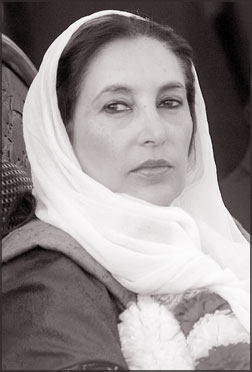
A seven-member team of doctors which examined her sent a report to
the health ministry saying Ms Bhutto had open wounds on her left
temporal region from which "brain matter was exuding". The report did
not say what caused the wound, apparently because no autopsy had been
performed on the body.
A day later, an Interior Ministry spokesman, Brig Javed Iqbal Cheema,
told the media that Ms Bhutto died of a skull fracture caused by a lever
attached to the sun-roof of her bullet-proof vehicle. He said she must
have hit her head against the lever when she ducked to escape the
assassins' bullets. He denied that her body carried any gunshot wounds.
These differing accounts inevitably fuelled speculation about a
possible cover-up at worst, and an attempt by the government to sidestep
its responsibility at best.
The interior ministry's version has been rubbished by Miss Bhutto's
Pakistan People's Party (PPP) which says that she was shot in the neck,
and that the bullet exited from the back of her head.
Party spokeswoman Sherry Rehman said that she was with Miss Bhutto
when the attack took place, and later cleaned her body at the hospital.
She says that she saw two wounds that were bleeding profusely.
Why does it matter?
One point of contention between the PPP and the government has been
the security provided to Ms Bhutto.
Given Ms Bhutto's status as a former prime minister and her
popularity, the government would not like to be seen as having failed to
provide adequate security to her, more so since the government itself
had warned Ms Bhutto about threats to her life.
But if the PPP's version is held to be true and the assassin indeed
got so close to Ms Bhutto as to be able to hit her at almost point-blank
range, then all sorts of questions are raised, ranging from lax security
to complicity by elements within the government.
Just how lax was the security?
At least two pieces of information that have come to light since the
assassination suggest that security for Ms Bhutto was indeed lax. One is
an e-mail she sent to her long time friend and lobbyist in the US, Mark
Siegal, on 26 October.
She wrote in the e-mail that she had been made to feel insecure by
(President) Musharraf's "minions" and had not received the requested
improvements to her security.
She said she was being prevented from using private cars or vehicles
equipped with tinted windows.
She said that she had also not been provided with jammers to prevent
remote controlled bombs or police mobile outriders to cover her vehicle
on all sides.
The other material is amateur video footage that appears to show a
man in sunglasses shooting her from close quarters and another man
draped in a white robe blowing himself up soon afterwards.
No security presence is seen in the entire video clip.
Media reports suggest that the police and rangers guarding checkposts
around the exit gate of Liaquat Bagh, where Ms Bhutto addressed the
rally, left their posts before Ms Bhutto's vehicle drove out of the
park.
Why did Bhutto's husband refuse an autopsy?
Ms Bhutto's husband, Asif Zardari, said that he was contacted by the
Punjab home secretary who wanted permission to hold a post mortem
examination, but that he refused the request.
"We know how these autopsies are conducted and how the reports can be
manipulated. We also know how she died," he told the media on Sunday.
In conservative Pakistani society, women's bodies are rarely allowed
by their relatives to be subjected to a post mortem examination. It is
even avoided in the case of men due to the belief that it constitutes
disrespect to the deceased.
Why was the scene of the blast hosed down?
The scene of the blast was washed with a high pressure hose of the
fire brigade hours after the incident, apparently to clean the road.
The interior ministry spokesman said the spot was washed after all
the required evidence had been collected by the investigators.
He brushed aside observations by the media that the investigators may
still have had to revisit the site for verification of evidence they had
collected earlier.
What evidence is there that the attack was ordered by the Taleban?
After the attack, the interior ministry provided the media with
transcripts of a telephone conversation between a top Taleban commander
in South Waziristan, Baitullah Mehsud, and an unnamed person.
The two congratulate each other on a job well done, but Miss Bhutto's
name is not mentioned in the brief conversation.
The ministry spokesman says an audio tape of the Pashto language
conversation can also be provided to the media, adding that the
government has Mr Mahsud's voice signature to prove that it is him
talking.
The transcripts were made public on the day an Italy-based news
agency - Adnkronos International - quoted an al-Qaeda spokesman, Mustafa
Abu al-Yezid, as claiming responsibility for the assassination.
Shortly before Ms Bhutto's return to Pakistan in October, the Daily
Times newspaper carried a statement from Mr Mahsud, saying he was
determined to kill her because she was an American agent.
A senator from South Waziristan who had reportedly passed the
statement to the newspaper denied having done so two weeks later, when
Ms Bhutto's convoy was bombed in Karachi on 18 October.
Mr Mahsud's spokesman has promptly denied the interior ministry's
allegation, claiming that the audiotape of the alleged telephonic
conversation is a fake.
He has also demanded investigation into the killing by "independent"
agencies to identify the actual culprits.
BBC
****
Bhutto successors face tough challenge
Pakistan's largest political party (PPP) has appointed Bilawal Bhutto
Zardari, the 19-year-old son of its slain leader Benazir Bhutto, as its
new chairman.
The party has also decided to contest parliamentary elections, due on
8 January. The first decision appears to be aimed at preventing internal
divisions in the party, while the second is meant to take at high tide
the sympathy wave for the PPP that has been caused by Ms Bhutto's
assassination last Thursday.
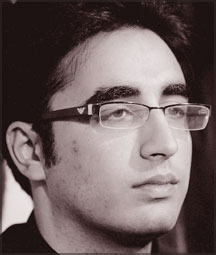
But in effect, the PPP would be run by Ms Bhutto's husband, Asif Ali
Zardari, until Bilawal completes his studies and is ready to assume the
party's leadership.
This brings Mr Zardari into direct focus as the party's de facto
chief, faced with the immediate challenge of guiding it through the
elections.
And the shrewd manner in which the question of succession has been
decided indicates that he may well prove to be as tough a customer for
President Pervez Musharraf as his late spouse.
Ms Bhutto represented the dynastic legacy of her charismatic,
populist father, Zulfikar Ali Bhutto, who ruled the country in the
1970s.
And she bore resemblance to him in everything, including her populist
style of politics, her charisma, and even her death.
Her father was overthrown in a military coup and hanged in 1979,
following a controversial trial. Her assassination last Thursday
appeared to have turned back the clock for PPP supporters.
This time the succession issue has been resolved by a hand-written
will that the party's 55-member executive committee says Ms Bhutto left
behind and in which she has nominated her husband as her successor.
Aware of the divisions it may cause in a party that was unlikely to
accept a non-Bhutto at the top, Mr Zardari has passed the mantle on to
his son, who has renamed himself as Bhutto.
BBC
Roberts' role as working mother
Oscar-winning actress Julia Roberts, who is starring in the film
Charlie Wilson's War with Tom Hanks, talks about how the film industry
has changed and how she juggles her film career with motherhood.
Julia Roberts is glad she is not starting out as an actress today.
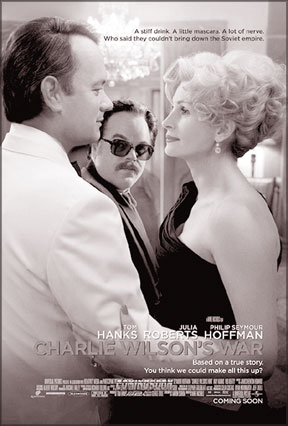
"I wouldn't want to be 20 and in movies now, it just looks awful,"
she says. In fact she has just turned 40 and her new movie, Charlie
Wilson's War, opens in the UK on 11 January.
"There weren't 1004 media outlets and now it just seems like sport.
The coverage of celebrities and celebrity lifestyle, it just seems like
a load of crap to me.
"It doesn't look fun. It just looks scary, crazy and chaotic. It's
all about superficial, hollow things. You don't hear anybody talking
about acting."
Nonetheless if you are Julia Roberts, how you look matters.
'Nice face'
When we meet on a cold, wet day in Los Angeles, she is wearing a
casual, long-sleeved patterned dress, thick black tights and chunky
boots.
Like most movie stars she is much thinner in the flesh. Her auburn
hair is loose and those famous lips highlighted with just a hint of pink
gloss.
She says she does not wear make up much. But can she really ignore
the march of time in an city obsessed with youth?
"On a day to day basis it's about if you're happy in you're life.
Someone said you wear your face in your life till you're 40 and then you
wear your life on your face. So I think that gives me a nice face."
However she admits she did worry about stripping down to a floral
fuchsia bikini for her role as a wealthy Texas socialite in Charlie
Wilson's War. She was four months pregnant and pleaded with director
Mike Nichols to let her keep her clothes on - he said no.
"That day was really nerve-wracking," she says.

"Fortunately it wasn't a terribly long scene. You know when you're
pregnant, some days you look really pregnant and some days you just
don't. That was one of those divine days when I just looked less
pregnant."
Five months later and her son Henry was born, a brother for twins
Phinnaeus and Hazel.
Her husband is cinematographer Danny Moder, and after a day of
interviews that accompany every major movie release she is keen to get
home to them.
They live a quiet life in California, away from the spotlight.
"I am a stay-at-home mum now, which is great, but a whole lot harder
than making a movie - it is a much longer day!" she says.
But the drive which saw her rise to the top and made her one of the
world's most bankable stars has not disappeared.
"I want to strive to accomplish things for me as an individual and as
an actor, as long as it doesn't take away from what I want to accomplish
as a wife and a mother."
It is a tough trick to pull off, as any working parent knows. Still,
if you are Julia Roberts you are in with a chance.
"I have a really great husband, who's also a great father. I have
great girlfriends and I'm in a position where I can have somebody help
me with my kids when I need that - I'm not doing it by myself."
BBC
2008: The year of Palestine?
Will 2008 see the creation of a Palestinian state, or will November's
Annapolis peace conference prove another false dawn?
US President George W Bush shows no inclination to become a lame
duck, pledging no let-up during his last year in office.
He is due to visit the Middle East early in 2008, a sign of his
personal commitment to advancing the peace process there.
But he will not find it easy to cut through the scepticism that is
widespread in the region.
With the problems of Iran, Iraq and Lebanon unresolved, few believe
the Middle East is going to become more stable any time soon.
Stagecraft or statecraft ?
Veteran US peace envoy Dennis Ross is left wondering whether the
Annapolis peace conference, which Mr Bush and Secretary of State
Condoleezza Rice hosted in November, was stagecraft or statecraft.
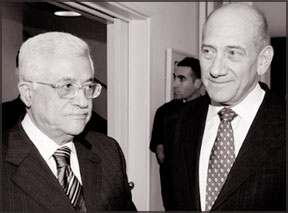
Addressing a conference organised in December by the Transatlantic
Institute, a Brussels think-tank, he questioned whether the Bush
administration was sufficiently engaged to bring about a meaningful
peace process.
There had to be real change on the ground, he said, for people to
believe peace was coming.
At Annapolis, Israeli Prime Minister Ehud Olmert and Palestinian
Authority President Mahmoud Abbas pledged to start continuous
negotiations, with the aim of bringing about a two-state solution by the
end of 2008.
But can they meet this ambitious goal?
David Makovsky, of the Washington Institute for Near East Policy,
says that for the first time we have an Israeli and a Palestinian leader
who trust one another.
Time wasting
But many observers argue they are both politically too weak to make
the hard compromises peace requires.
Avraham Sela, an Israeli academic and former intelligence officer,
thinks it counter-productive to exclude Hamas, the Islamist movement
which now runs Gaza.
In his view, the Palestinian Authority run from the West Bank by
Hamas's great rival, Fatah, is virtually dead - and efforts by the West
to resuscitate it are a waste of time.
The conference debated other challenges ranging from demography to
nuclear proliferation.
Sir Mark Allen, a former British diplomat, pointed out that by 2050
the population of the Middle East will have grown from 430 million to
720 million.
Will the young prove co-optable by dynasties resistant to change?
Off the table
Steven Cook, of the Council on Foreign Relations, assessed the meagre
results of the Bush administration's promotion of democratic reform in
the region.
But in his view there could be no going back to uncritical support of
authoritarian regimes. George Bush's successor, whether a Democrat or a
Republican, would find the issue still firmly on the foreign-policy
agenda.
Speakers evinced little optimism about either Iraq or Iran.
There was a real risk the so-called "surge" in Iraq would buy
short-term success at the expense of long-term gains, according to
Michael Rubin, a neo-conservative at the American Enterprise Institute.
One of his colleagues, Reuel Marc Gerecht, said the new US intelligence
estimate on Iran had "demolished" the administration's policy - and
meant that a military strike against Iran was now "off the table".
Wrapping up the conference, Lebanese analyst Kassem Jaafar saw no
reason why Iran was likely to change course - and warned of the danger
that the fledgling peace process initiated at Annapolis would prove
another missed opportunity.
BBC
Crunch year ahead for Iraq
More so than any other since the toppling of Saddam Hussein, 2008 is
set to be a make-or-break year for Iraq.
The country ended 2007 on a high. The last third of the year saw a
dramatic improvement in the security situation in many of the most
troubled areas, including much of Baghdad.
The number of attacks of all sorts, and the ensuing casualties,
showed a sustained decline.
But none of the threats to Iraq's stability and future has been
definitively defeated. None of the factors feeding into the improvement
is irreversible.
Window of opportunity
And there have been many warnings that if the security gains are not
underpinned by political and economic measures, they risk being
squandered.
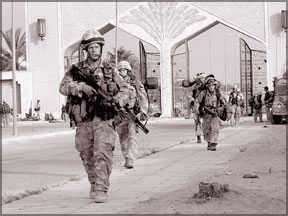
So there is a window of opportunity which could close sharply if it
is not exploited. If things go well, 2008 could see the security
improvement consolidated further, with revitalised Iraqi army and police
forces taking the lead.
The centre could be strengthened by nation-building legislation and
political reconciliation, and the new stability could give birth to an
economic surge that would add to the positive dynamic. But that vision
could turn out to be a pipe dream - it is not hard to imagine a much
grimmer scenario, such as:
bickering Iraqi politicians fail to rise above their differences and
agree vital legislation, which is already months behind schedule and
would weld the country together
as US forces start to thin out to pre-surge levels by July 2008,
al-Qaeda begins to make a comeback
Sunni "local security" forces established by the US, clash with Shia
militias, which laid low until the American grip loosened
Iraq disintegrates into sectarian strife, perhaps descends into
unequivocal civil war.
Prime Minister Nouri Maliki has said that 2008 will be the year of
reconstruction and development, following what he says is the defeat of
al-Qaeda and terrorism.
Few others are so starkly optimistic, least of all the Americans,
whose claims are more modest and qualified.
"You're certainly not going to hear from me that al-Qaeda is defeated
and that victory is at hand," said the US ambassador, Ryan Crocker.
"Al-Qaeda has shown an extraordinary persistence, and they are
persisting now, although clearly, their abilities have been badly
damaged."
Troop surge
The past 12 months saw a double body-blow dealt to al-Qaeda and the
Sunni-based insurgency, which had many strands.
The US troop surge, built up over the first half of 2007, saw the
Americans directly and more proactively tackling the militant Islamist
groups linked to al-Qaeda under the umbrella of the "Islamic State in
Iraq".
At the same time, a number of the more Iraqi nationalist insurgent
groups, such as the 1920 Revolution Brigades and the Islamic Army in
Iraq, turned against the al-Qaeda radicals and joined Sunni tribal
leaders in urging their followers to join the Americans against them.
The result: by the end of the year, around 80,000 Sunni youths were
on the US payroll as local guards looking out for al-Qaeda infiltrators.
This had a big effect in pacifying troubled Sunni areas such as Anbar
province and parts of Baghdad. But the campaign is unfinished, with
frequent violence in areas to the north of the capital, and displaced
Islamist radicals surfacing at Mosul in the far north too.
Many of the Sunni vigilantes have Shia blood on their hands, and
their emergence as virtual militias has raised fears of future sectarian
battles if things go wrong.
On the Shia side of the equation, the order given in August by the
Shia cleric Moqtada Sadr to his Mehdi Army militia to halt hostilities
for six months had a big effect in reducing violence.
Direct talks
That decision may have been influenced by Iran, which, also in
August, promised Prime Minister Nouri Maliki that it would stop
supporting Shia militias and put its weight behind the Baghdad
government. Starting in March, Iranian and US officials held several
rounds of direct talks on Iraq, a dialogue that is set to continue.
US commanders have said there are signs of a drop in help from Iran
for radical Iraqi militias, and also in the flow of Arab fighters coming
across the border from Syria.If the current signs of a slight thaw in
Washington's relations with Tehran and Damascus are sustained in 2008,
that would benefit Iraq.
But it will not be an easy year.
In the south, British forces have already handed over security
control to Iraqis and taken up a background role, which will see UK
forces cut by half to a mere 2,500 or so in the spring.
BBC
France extends ban on cigarettes
Smoky cafes - a hazy memory:
France, the nation that coined the words cigarette and nicotine, bids
adieu to centuries of smoking tradition today with the start of a ban on
lighting up in cafs and restaurants.
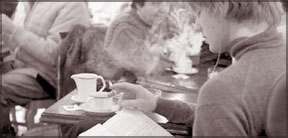
Nostalgia for the old caf society was running high last night as
smokers greeted the new year with sardonic moans over un-Gallic
intolerance. Nonetheless, the new clean-air law was welcomed by the
great majority.
At the Royal Pereire, an old-style brasserie near the Arc de Triomphe,
Jean-Daniel Prevost, 55, stubbed out his last butt on the floor and
mourned the end of the caf-clope (espresso-and-fag). "They're taking
away another part of life, but you can't fight them any more," he said.
Ban on smoking in public and work spaces was extended to "places of
entertainment and conviviality". These locations, which also include
night clubs, casinos and discos, had been given a reprieve to prepare
for the shock.
To soften the blow further the prohibition will be policed only from
tomorrow, initially sparing smokers from the ?68 (50) fine and
proprietors the ?750 penalty for allowing the breach. The ban is not
absolute because smoking will be tolerated on terraces, even if they are
covered. Sealed and ventilated smoking chambers are also allowed but
their specifications are strict.
Under fire from tobacconists and country caf owners, Roselyne
Bachelot, the Health Minister, promised zero tolerance for offenders
yesterday and said that the ban was a revolution that would improve
everyone's health. About 66,000 smokers and 6,000 non-smokers die
annually from inhaling the fumes of the quarter of the adult population
who still smoke, the Government says.
Ms Bachelot ruled out an exception for rural caf owners who say that
community life will come to an end when smoking is barred from the only
village bar-tabac. Ren Le Pape, the militant head of the tobacconists'
association, predicted chaos and said that Ms Bachelot did not know what
she was talking about.
"I invite Ms Bachelot to come and see if the ban is so easy to apply
as she makes out," he said. The Government's efforts to promote the new
smoke-free life have not been helped by a glossy magazine spread last
month showing President Sarkozy puffing a fat cigar at his desk in the lyse
Palace. The teetotal "Super-Sarko" is an unrepentant fan of large
Havanas.
Media and the catering industry expect France to adjust to smoke-free
dining, just as Britain, Italy and Ireland have done, despite resistance
from die-hard addicts and proprietors. Libration, the newspaper founded
by Jean-Paul Sartre, the chain-smoking existentialist philosopher,
predicted: "The tobacco war will not take place.
The majority of smokers and non-smokers are in favour of the end of
cigarettes in restaurants and cafs. Everyone recognises that smoke is
harmful."
BBC |
